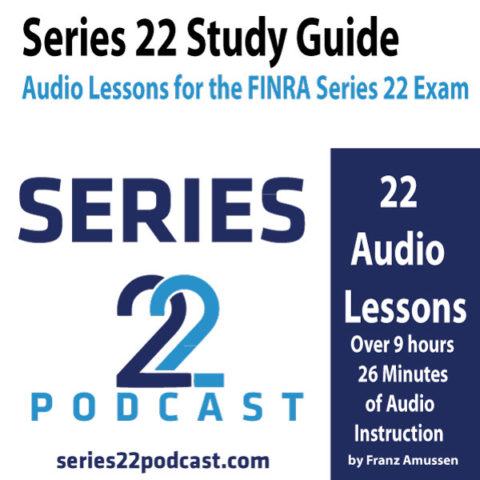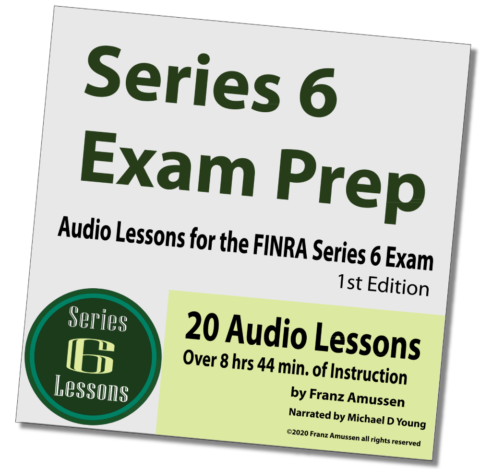Lesson 19 Types of Accounts:
Types of Accounts
An individual account account is one that is owned by a single person. Only he or she can determine which securities are bought or sold and they get all the proceeds from the account.
A joint account is owned by two or more people. Any of the parties can buy or sell securities and can receive proceeds. The registered representative does not need to confirm transactions with the other partners on the account. All of the owners have to sign a joint account agreement when they open the account. Any checks that are taken from the account are made out in the names of all parties.
A joint tenants with rights of survivorship accounts means that if one of the joint owner dies, all the assets of the deceased partner go to the living partner or partners. All parties have an equal and undivided interest in the account.
A joint tenants in common account means that if one of the joint tenants dies, the assets of that tenant go to that tenant’s estate and not to the other partner. The assets do not have to be divided equally in this arrangement.
A transfer on death account means the owner gets to name a beneficiary to whom the account will transfer when he or she dies.
If an agent hears that a customer has died, he has to act at once to cancel any open orders and note on the account that the holder is deceased. Then, he or she should wait for instructions from the customer’s estate as to what should happen next. In order to liquidate the assets, the agent needs to receive letters testamentary, inheritance tax waivers, and a certified copy of the death certificate.
Corporate accounts are those owned by a corporation. To open one of these accounts, the registered representative needs to get a corporate resolution that lets him know which people in the corporation have the authority to buy and sell securities in their behalf.
Trust accounts come in two varieties: revocable and irrevocable. With a revocable trust, the person who creates the trust, the grantor, can decide to take the assets in the trust back. This cannot happen with an irrevocable trust. If it is a simple trust, the proceeds have to be given to beneficiary in the year they are earned. If it is a complex trust, the trust can keep some of the income and they have to pay taxes on whatever is not given to the beneficiary. A trust can be set up in a will to distribute assets after a person dies.
A partnership account starts with a partnership agreement that states who is allowed to transact business for the partnership. This can be set up in a family, with the parents being the general partners with the children set up as limited partners.
There are some kinds of accounts where someone other than the beneficiary can enter orders in behalf of the account. This types of accounts include discretionary accounts, custodial accounts, and fiduciary accounts.
A discretionary account grants the registered representative additional rights. They do not have to get approval to purchase or sell an asset in any amount. The principal of the firm has to review these kinds of accounts more often to prevent abuses of power. This kind of account requires a limited power of attorney, which is good for up to three years. If the representative leaves the firm, this arrangement is automatically terminated.
A fiduciary account is one that is managed by a third party for the account holder. They should act in the best financial interest of the account holder. They may have full or limited power of attorney, depending on the arrangement. A registered representative will need to see documentation that proves that the fiduciary is allowed to transact business on the account.
A uniform gift to minors account (UGMA) is sometimes created because minors are not allowed to own securities in their own names, because they cannot enter into legally-binding contracts. These accounts are opened for the benefit of a minor and there must be an adult custodian, one minor as the beneficiary, UGMA and the state on the account title, and the assets have to be registered in the child’s name when they come of age.
The custodian cannot invest in certain things that are too risky in an UGMA account, such as penny stocks, commodities, and speculative option strategies. They can only withdraw funds to reimburse them for expenses related to the account. The account can contain cash, securities or other property. There is no limit to how much can be given, but only the first $15,000 is tax free. These gifts cannot be revoked.
A slightly different account is the Uniform Transfer to Minor’s Act, which means that the custodian gets to decide when the minor gets the assets, with the maximum age being 25 years old.
If a customer wishes, a broker dealer can open a numbered account for a customer, which means that the account is only identified by a number or symbol. They have to create a statement connecting them to the account.
Customers can sometimes wish to transfer their accounts from one firm to another. This is often down through the Automated Client Account Transfer system. (ACAT). This system gives instructions to both the old firm and the new firm as to how to proceed with transferring the account.
If you are ready to get serious and want the full series of Series 22 Audio Lessons…
In order to take the Series 22 Exam you must also Pass the SIE Exam
We also have audio lessons for the following exams:
Podcast: Play in new window | Download








